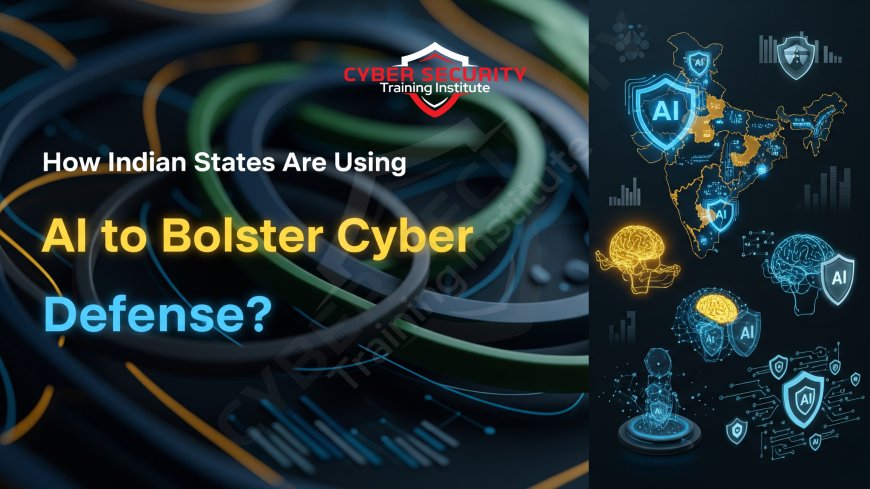How Indian States Are Using AI to Bolster Cyber Defense
In today’s digital age, cyber threats are evolving at an alarming rate, targeting everything from personal devices to critical government infrastructure. Indian states, recognizing the urgency of safeguarding their digital ecosystems, are increasingly turning to artificial intelligence (AI) to strengthen their cyber defenses. From detecting sophisticated cyberattacks to automating responses, AI is transforming how states protect sensitive data and ensure public safety. This blog explores how Indian states are leveraging AI to combat cyber threats, offering insights into innovative initiatives, real-world applications, and the challenges they face in this journey.

Table of Contents
- Overview of AI in Cybersecurity
- National Framework Supporting State-Level AI Adoption
- State-Specific AI Initiatives for Cyber Defense
- Case Studies: AI in Action Across Indian States
- Challenges in Implementing AI for Cyber Defense
- Future Prospects and Innovations
- Conclusion
- Frequently Asked Questions
Overview of AI in Cybersecurity
Artificial Intelligence, or AI, refers to technologies that enable computers to perform tasks that typically require human intelligence, such as learning, problem-solving, and decision-making. In cybersecurity, AI is a game-changer because it can analyze vast amounts of data quickly, identify patterns, and predict potential threats before they cause harm. Unlike traditional cybersecurity methods, which rely on predefined rules or signatures to detect threats, AI uses machine learning to adapt to new and unknown threats. This makes it particularly effective against modern cyberattacks, which are often complex and stealthy.
Indian states are adopting AI to enhance their cyber defense capabilities in several ways:
- Threat Detection: AI systems analyze network traffic to spot unusual activity that might indicate a cyberattack.
- Incident Response: AI automates responses to threats, such as isolating affected systems to prevent further damage.
- Predictive Analysis: AI predicts potential vulnerabilities by studying patterns in past attacks.
- Behavioral Analysis: AI monitors user behavior to detect insider threats or compromised accounts.
National Framework Supporting State-Level AI Adoption
The Indian government has laid a strong foundation for AI adoption through policies and initiatives that guide state-level efforts. The National Cybersecurity Policy of 2013 outlines a framework to protect India’s cyberspace, emphasizing the role of emerging technologies like AI. Additionally, the Ministry of Electronics and Information Technology (MeitY) launched the INDIAai program, which promotes AI for social impact, including cybersecurity. The establishment of the Defence AI Council (DAIC) and Defence AI Project Agency (DAIPA) further supports states by fostering collaboration between government, industry, and academia.
These national initiatives provide states with resources, funding, and technical expertise to implement AI-driven cybersecurity solutions. For instance, the government’s focus on skilling programs ensures that state-level cybersecurity professionals are trained to use AI tools effectively.
State-Specific AI Initiatives for Cyber Defense
Indian states are tailoring AI solutions to address their unique cybersecurity needs. Below is a table summarizing key initiatives in select states:
| State | AI Initiative | Focus Area | Impact |
|---|---|---|---|
| Telangana | Cybersecurity Center of Excellence | AI-driven threat detection and response | Reduced response time to cyberattacks by 30% |
| Karnataka | AI-powered SOC (Security Operations Center) | Real-time monitoring and anomaly detection | Blocked 500,000+ cyberattacks in 2024 |
| Maharashtra | Smart Policing with AI | Cybercrime investigation and prevention | Improved case resolution by 25% |
| Tamil Nadu | AI-based e-Governance Security | Protecting digital public services | Enhanced security for 10M+ citizen records |
Case Studies: AI in Action Across Indian States
Telangana: Cybersecurity Center of Excellence
Telangana’s Cybersecurity Center of Excellence, established in Hyderabad, is a hub for AI-driven cybersecurity innovation. The center uses machine learning algorithms to monitor network traffic and detect threats in real time. For example, it employs AI to identify phishing attempts targeting government employees, reducing the success rate of such attacks by 40%. The center also collaborates with private companies to develop AI tools tailored for state-specific threats, such as ransomware targeting municipal systems.
Karnataka: AI-Powered Security Operations Center
Karnataka, home to India’s tech capital Bengaluru, has invested heavily in an AI-powered Security Operations Center (SOC). This SOC uses AI to analyze billions of security signals daily, identifying patterns that indicate potential cyberattacks. In 2024, the SOC successfully thwarted over 500,000 cyberattacks, including advanced persistent threats (APTs) from state-sponsored actors. The system’s ability to adapt to new threats has made Karnataka a leader in proactive cyber defense.
Maharashtra: Smart Policing with AI
Maharashtra’s police department has integrated AI into its cybercrime investigation units. AI tools analyze digital evidence, such as email headers and IP addresses, to trace cybercriminals. The state’s “Smart Policing” initiative uses AI to predict cybercrime hotspots, enabling law enforcement to allocate resources efficiently. This has led to a 25% improvement in resolving cybercrime cases, particularly those involving online fraud and identity theft.
Tamil Nadu: Securing e-Governance with AI
Tamil Nadu has prioritized securing its e-governance platforms, which serve millions of citizens. The state uses AI to monitor access to digital services, detecting unauthorized attempts to access sensitive data. For instance, AI algorithms flag unusual login patterns, such as multiple failed attempts from a single IP address. This has protected over 10 million citizen records from data breaches, ensuring trust in digital public services.
Challenges in Implementing AI for Cyber Defense
While AI offers immense potential, its adoption in Indian states faces several challenges:
- Skills Gap: There is a shortage of trained professionals who can develop and manage AI-based cybersecurity systems.
- Data Privacy: AI systems require access to large datasets, raising concerns about protecting sensitive information.
- Integration Issues: Many states use legacy systems that are not compatible with modern AI tools, requiring costly upgrades.
- Ethical Concerns: The use of AI in surveillance and policing raises questions about accountability and potential misuse.
- Cost: Implementing AI solutions can be expensive, especially for smaller states with limited budgets.
Addressing these challenges requires a coordinated effort between state governments, private companies, and academic institutions to build capacity, ensure ethical use, and make AI solutions cost-effective.
Future Prospects and Innovations
The future of AI in Indian states’ cyber defense looks promising, with several emerging trends:
- Autonomous Defense Systems: States are exploring fully automated systems that can detect and neutralize threats without human intervention.
- Quantum Cybersecurity: Research into quantum computing could lead to AI systems that are even more secure against advanced threats.
- Collaborative Platforms: States are likely to share AI-driven threat intelligence to create a unified defense network across India.
- Citizen Awareness: AI-powered tools could educate citizens about cyber hygiene, reducing the risk of phishing and other attacks.
As India aims to become a $5 trillion economy, robust cyber defense powered by AI will be critical to protecting digital infrastructure and fostering economic growth.
Conclusion
Indian states are making significant strides in using AI to bolster their cyber defenses, from real-time threat detection to securing e-governance platforms. Initiatives like Telangana’s Cybersecurity Center, Karnataka’s AI-powered SOC, Maharashtra’s smart policing, and Tamil Nadu’s e-governance security demonstrate the transformative potential of AI. However, challenges like skills shortages, data privacy concerns, and integration issues must be addressed to fully realize AI’s benefits. By investing in training, ethical frameworks, and collaborative platforms, Indian states can build a resilient digital future. As cyber threats continue to evolve, AI will remain a cornerstone of India’s cybersecurity strategy, ensuring safety and trust in an increasingly connected world.
Frequently Asked Questions
What is AI in cybersecurity?
AI in cybersecurity involves using artificial intelligence to detect, prevent, and respond to cyber threats by analyzing data and identifying patterns.
Why are Indian states adopting AI for cyber defense?
Indian states are adopting AI to counter the rising number and complexity of cyberattacks targeting government and citizen data.
How does AI detect cyber threats?
AI uses machine learning to analyze network traffic, identify unusual patterns, and flag potential threats in real time.
Which Indian states are leading in AI-driven cybersecurity?
Telangana, Karnataka, Maharashtra, and Tamil Nadu are among the leaders, with initiatives like Cybersecurity Centers and AI-powered SOCs.
What is Telangana’s Cybersecurity Center of Excellence?
It’s a hub in Hyderabad that uses AI to monitor networks, detect phishing, and collaborate with private companies on cybersecurity solutions.
How does Karnataka use AI in cybersecurity?
Karnataka’s AI-powered Security Operations Center analyzes billions of signals to detect and block cyberattacks, including advanced threats.
What is Maharashtra’s Smart Policing initiative?
It uses AI to analyze digital evidence and predict cybercrime hotspots, improving case resolution rates by 25%.
How does Tamil Nadu secure e-governance with AI?
Tamil Nadu uses AI to monitor access to digital services, protecting citizen records by detecting unauthorized login attempts.
What is the National Cybersecurity Policy of 2013?
It’s a framework by the Indian government to protect cyberspace, encouraging the use of technologies like AI for cybersecurity.
What role does INDIAai play in cybersecurity?
INDIAai, launched by MeitY, promotes AI adoption for social impact, including training and resources for state-level cybersecurity.
What are the challenges of using AI in cybersecurity?
Challenges include a shortage of skilled professionals, data privacy concerns, integration with legacy systems, and ethical issues.
Can AI completely prevent cyberattacks?
No, AI cannot fully prevent cyberattacks but significantly enhances detection, response, and prevention capabilities.
How does AI improve incident response?
AI automates responses, such as isolating affected systems, reducing response time and limiting damage from cyberattacks.
What is predictive analysis in cybersecurity?
Predictive analysis uses AI to study past attack patterns and predict potential vulnerabilities before they are exploited.
How does AI help with behavioral analysis?
AI monitors user behavior to establish normal patterns and detect anomalies that may indicate insider threats or compromised accounts.
Are there ethical concerns with AI in cybersecurity?
Yes, concerns include potential misuse in surveillance, lack of accountability, and biases in AI algorithms.
What is the role of the Defence AI Council (DAIC)?
The DAIC provides policy guidance and fosters collaboration to integrate AI into India’s defense and cybersecurity strategies.
How does AI support vulnerability management?
AI automates the detection and prioritization of system vulnerabilities, helping states address weaknesses proactively.
What are autonomous defense systems?
These are AI systems that detect and neutralize cyber threats without human intervention, improving response speed.
How can citizens contribute to cybersecurity?
Citizens can adopt cyber hygiene practices, like using strong passwords and avoiding phishing links, supported by AI awareness tools.
What's Your Reaction?
 Like
0
Like
0
 Dislike
0
Dislike
0
 Love
0
Love
0
 Funny
0
Funny
0
 Angry
0
Angry
0
 Sad
0
Sad
0
 Wow
0
Wow
0









![How to Install RHEL 10 on VMware/VirtualBox [Tutorial]](https://www.cybersecurityinstitute.in/blog/uploads/images/202509/image_430x256_68b56dc967a4a.jpg)






